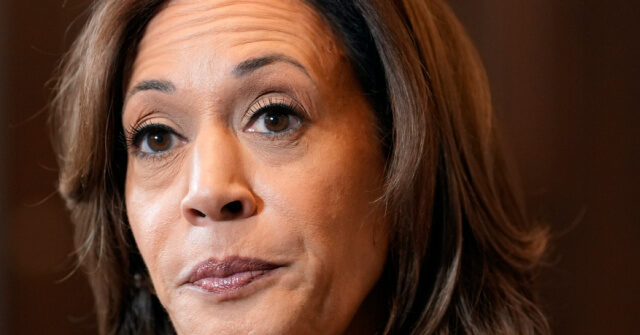Vice President Kamala Harris recently appeared on a podcast hosted by Dr. Mike Varshavski, a prominent health YouTuber with a significant following. During the interview, Dr. Varshavski posed a straightforward question regarding potential plans to reduce grocery prices and improve the availability of whole foods. Harris’s response, however, seemed scripted and heavily reliant on cues from off-camera advisers, as she frequently looked down and off to the side while delivering her answer. This reliance on notes became evident as she expressed her commitment to lowering the cost of living, which she identified as a top priority, including the cost of groceries. The situation raised eyebrows, suggesting that the Vice President may have struggled to provide a cohesive or innovative response without external guidance.
In her extended reply, Harris mentioned her focus on price gouging, particularly in the context of natural disasters. She recalled her experience as California’s Attorney General, where she witnessed predatory pricing during emergency situations. This acknowledgment of price gouging was likely a reference to practices where sellers exploit crises to raise prices on essential goods, including food, thereby harming vulnerable communities. While she aimed to connect her response to broader economic issues, critics pointed out that the connection appeared tenuous, particularly given the current inflation rates that have seen grocery prices increase significantly since she took office. The focus on hurricanes could be interpreted as a deflection from addressing more immediate and systemic factors that contribute to rising grocery costs.
The exchange was quickly seized upon by opposition figures, with Donald Trump’s War Room tweeting a critical commentary on Harris’s performance. The captions highlighted her tendency to look at her notes and advisers while speaking, suggesting a lack of confidence or preparedness in discussing such a pressing issue. Critics argued that this reliance on pre-written statements undermined her credibility and raised questions about the administration’s commitment to tackling inflation and consumer concerns regarding food prices. The clip underscored a broader narrative around political figures potentially being out of touch with everyday issues, especially in light of rising costs affecting many Americans’ budgets.
Harris’s comments and the ensuing backlash come at a time when inflation remains a significant concern for the Biden administration. Grocery prices have reportedly surged over 25% during her tenure, leading to public frustration and skepticism about government responses to economic pressures. As a key figure in the administration, the Vice President’s inability to provide concrete plans or solutions during the interview was seen as problematic, particularly for an audience that may be looking to leaders for reassurance and strategic intervention in difficult economic times. Many consumers are acutely aware of how rising costs affect their daily lives, and they expect their elected officials to not only acknowledge these challenges but also propose actionable solutions.
In response to the criticism, some commentators pointed out that political leaders often rely on scripts and coaching, particularly during media appearances. However, the noticeable emphasis on these cues may indicate a lack of familiarity with the subject matter or an inability to engage spontaneously with pressing economic issues. While there’s an understanding that high-pressure environments can lead to prepared remarks, the expectation for leaders, especially Vice Presidents, is to exhibit fluency in discussing key policy areas. The perceived disconnect between Harris’s rehearsed responses and the real concerns of American families reflects a need for more authentic communication and substantive dialogue about economic realities.
As the administration grapples with these complexities, the criticism surrounding Harris’s response may serve as a wake-up call. The expectation is not only for political leaders to acknowledge public concerns about inflation and grocery prices but to also convey a sense of urgency and plan in addressing them. Moving forward, the Biden administration may need to reassess its public communication strategies and ensure that officials are equipped to engage with the media and the public in a manner that feels genuine and informed. This could enhance public trust and demonstrate a commitment to tackling the challenges many Americans are facing, thereby fostering stronger connections with constituents who seek meaningful solutions to pressing economic issues.

